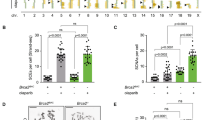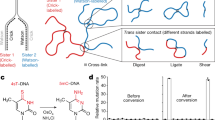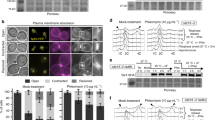Abstract
MECHANISMS of formation of chromatid aberrations are not fully understood. The involvement of chromosome breakage and reunion1 or exchange2 has been suggested. DNA repair is a possible cause of aberrations and exchanges3–5, but a causal relationship between the two phenomena is not clear6,7. It is not known whether chromatid deletions derive from unrepaired chromatid breaks or from incomplete exchanges between sister chromatids. The origin of chromatid deletions can be studied by examining whether or not they occur just at the points of sister chromatid exchanges (SCE) (ref. 6). Differential labelling of sister chromatids with 5-bromodeoxyuridine (BUdR) has shown that X-ray-induced chromatid deletions are only infrequently associated with SCE, indicating that most chromatid deletions are not incomplete SCE but simple chromatid breakage8. On the other hand, the parallel distribution of SCE and chromosome aberrations induced by two different hydrocarbon carcinogens, 7,12-dimethylbenz (a) anthracene and 7,8,12-trimethylbenz (a) anthracene has been reported, suggesting that aberrations are incomplete SCE (ref. 9). The results presented here indicate that almost no chromatid deletions or gaps induced by irradiation of BUdR-substituted chromosomes with visible light represent incomplete SCE.
This is a preview of subscription content, access via your institution
Access options
Subscribe to this journal
Receive 51 print issues and online access
$199.00 per year
only $3.90 per issue
Buy this article
- Purchase on Springer Link
- Instant access to full article PDF
Prices may be subject to local taxes which are calculated during checkout
Similar content being viewed by others
References
Sax, K. Genetics 23, 494–516 (1938).
Revell, S. H. Proc. R. Soc. Lond. B 150, 563–389 (1959).
Bender, M. A., Griggs, H. G. & Walker, P. L. Mutat. Res. 20, 387–402 (1973).
Latt, S. A. Proc. natn. Acad. Sci. U.S.A. 71, 3162–3166 (1974).
Perry, P. & Evans, H. J. Nature 258, 121–125 (1975).
Meddle, J. A. & Bodycote, D. J. Mutat. Res. 9, 117–126 (1970).
Revell, S. H. in Advances in Radiation Biology 4 (eds Lett, J. T., Adler, H. & Zelle, M.) 367–416 (Academic, New York, 1974).
Wolff, S. & Bodycote, D. J. Mutat. Res. 29, 85–91 (1975).
Ueda, N., Uenaka, H., Akematsu, T. & Sugiyama, T. Nature 262, 581–583 (1976).
Ley, R. D. & Setlow, R. B. Biophys. J. 12, 420–431 (1972).
Dewey, W. C. & Humphrey, R. M. Radial. Res. 26, 538–553 (1965).
Ikushima, T. & Wolff, S. Expl Cell Res. 87, 15–19 (1974).
Korenberg, J. R. & Freedleuder, E. F. Chromosoma 48, 353–360 (1974).
Perry, P. & Wolff, S. Nature 251, 156–158 (1974).
Author information
Authors and Affiliations
Rights and permissions
About this article
Cite this article
IKUSHIMA, T. Role of sister chromatid exchanges in chromatid aberration formation. Nature 268, 235–236 (1977). https://doi.org/10.1038/268235a0
Received:
Accepted:
Issue Date:
DOI: https://doi.org/10.1038/268235a0
This article is cited by
-
Time course changes of anti- and pro-apoptotic proteins in apigenin-induced genotoxicity
Chinese Medicine (2013)
-
Bimodal induction of sister-chromatid exchanges by luminol, an inhibitor of poly(ADP-ribose) synthetase, during the S-phase of the cell cycle
Chromosoma (1990)
-
On the origin of chromosomal aberrations in human peripheral lymphocytes in vitro
Human Genetics (1984)
-
Evidence that sister chromatid exchanges and chromatid breaks are two independent events
Chromosoma (1982)
-
Analysis of a BrdU-sensitive site in the cactus mouse (Peromyscus eremicus): chromosomal breakage and sister-chromatid exchange
Chromosoma (1980)
Comments
By submitting a comment you agree to abide by our Terms and Community Guidelines. If you find something abusive or that does not comply with our terms or guidelines please flag it as inappropriate.



